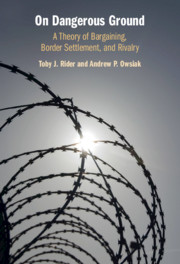Book contents
- Frontmatter
- Dedication
- Contents
- List of Figures
- List of Tables
- Preface
- 1 Introduction
- Part I The Settlement of Borders
- Part II The Effects of Unsettled Borders on Interstate Relationships
- 5 A Theory of Borders and Rivalry Initiation
- 6 An Empirical Evaluation of Borders and Rivalry Initiation
- Part III Borders and Rivalry Termination
- Bibliography
- Index
6 - An Empirical Evaluation of Borders and Rivalry Initiation
from Part II - The Effects of Unsettled Borders on Interstate Relationships
Published online by Cambridge University Press: 26 February 2021
- Frontmatter
- Dedication
- Contents
- List of Figures
- List of Tables
- Preface
- 1 Introduction
- Part I The Settlement of Borders
- Part II The Effects of Unsettled Borders on Interstate Relationships
- 5 A Theory of Borders and Rivalry Initiation
- 6 An Empirical Evaluation of Borders and Rivalry Initiation
- Part III Borders and Rivalry Termination
- Bibliography
- Index
Summary
Chapter 6 evaluates the relationship between border settlement and the onset of interstate rivalry.We estimate a series of models based on existing rivalry research.These models provide a baseline comparison to our fully specified models, which include unsettled borders and power endowments.Several key findings emerge.Strong support is found for all the expectations derived from the commitment problem framework. Unsettled borders are associated with an increased likelihood of rivalry initiation. Power endowments feature disproportionately more often in contiguous dyad-years with unsettled borders relative to settled borders. Neighboring states are more likely to form rivalries when contesting territory with power endowments. Mixed and relatively weak evidence is found for alternative explanations. Democratic neighbors are less likely to form rivalries but the results are not consistent across models. States closer in power are more likely to form rivalries but again the results are inconsistent. No relationship is found between allied states and rivalry formation, and little evidence is found that disputed ethnic identify claims are related to rivalry initiation.
Keywords
- Type
- Chapter
- Information
- On Dangerous GroundA Theory of Bargaining, Border Settlement, and Rivalry, pp. 166 - 198Publisher: Cambridge University PressPrint publication year: 2021

